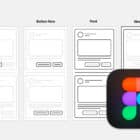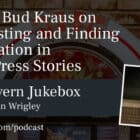WordCamp US 2019 is taking place for the first time in St. Louis, Missouri, where more than 1,300 WordPress community members and leaders are gathered.
It’s been the year of Gutenberg in 2019, and in his State of the Word, Matt Mullenweg highlighted what has been accomplished and what is coming next.
Matt kicked off the event with the premiere of Open: The Community Code, a film about the WordPress open source community.
Open was really well done and made a great introduction to Matt’s review of the year’s achievements. In the film, Matt says that $10 billion flows through the WordPress economy every year, but that doesn’t define the community. WordPress is more than code, more than business. Matt says, “It’s more than a tool.” It’s more like a canvas that “anyone can paint on.”
Open is a film about WordPress and what WordPress really is — not just software, but people, a community, and a mission. Open is a documentary short produced by Andrew Rodriguez and directed by Sean Korbitz. Executive producers Mark Maunder and Kathy Zant of WordFence contributed to the production of Open as well, and they are submitting it to independent and documentary film festivals.
The WordPress Community
The community continues to evolve, thrive, and adapt to the changing environment.
WordCamp US 2020
The next WordCamp US will be hosted during the workweek and won’t overlap with Halloween. This is something I’m personally thankful for, as it opens up the weekend for family. Many people, including me, got to the conference late this year due to spending the holiday trick-or-treating with family.
Volunteers Organizers, Speakers, and Sponsors
WCUS was made possible by 47 organizers, 122 volunteers, and 90 speakers. Bluehost, WooCommerce, Jetpack, and Google are this year’s lead sponsors. Thank you to everyone!
Meetups, People, and Community Endeavors
There have been more than 5,000 WordCamp events and several do_action WordPress community events as well.
One HeroPress story per month is now being featured on the WordPress blog.
Matt honored Alex Mills, a prolific early and long-time contributor to WordPress who passed away in 2015.
WordCamps
There will be a total of 141 WordCamps in 2019, including 34 in brand new cities. There are also 17 KidsCamps happening in 2019.
This year there are at least four WordCamp US speakers under age 15, which makes them younger than WordPress itself.
In 2020, the first WordCamp Asia is happening in February, in Bangkok, Thailand. WordCamp Europe will convene in Porto, Portugal.
One year ago
WordPress 5.0 was released just before WCUS began in Nashville last year, a contentious decision on timing in itself. 2018 was what Matt calls a “controversial year,” where we wanted to “disrupt ourselves.” Gutenberg was included in core despite a lot of criticism in and outside of the community about this decision. Matt says we learned a lot from the process, and it was “really good practice for future changes we want to make.”
He also added, “I understand why we had a lot of this feedback,” and he expressed excitement for WordPress’s future.
Ways to Get Involved with WordPress
Matt highlighted several ways to get involved in the WordPress community today:
- Participate in WordCamp contributor days, including one at WCUS.
- Install the Gutenberg plugin, which is now a testing ground for features. About 275,000 people are taking part in this effort.
- Install Design Experiments, a new feature plugin to test user interface experiments.
- Create blocks! Matt made a call for Gutenberg block creation to “expand the window for how people are creating WordPress sites today.” If it’s JavaScript only it will be able to go easily into the new block directory.
- Help teach others in the community.
When Matt says why we do all this, he says it’s to “help the open web.” He says the open web is like a pendulum that can swing to being more closed or more open over time.
Five for the Future
There’s now a dedicated landing page for Five for the Future to highlight people and organizations devoting 5% of their resources to WordPress development through this program.
Core WordPress Development
There have been two core releases in 2019. WordPress 5.1, “Betty,” brought the “Site Health” screen, along with other feature adjustments and bug fixes. It also included the Cron API and Site Meta for Multisite.
WordPress 5.2, “Jaco,” included live block previews, better block management, and the end of the WSOD (White Screen of Death).
WordPress 5.3 will be released on November 12th. It includes more than 150 block editor improvements. Also in 5.3 is the beautiful Twenty Twenty theme. And thanks to a new security feature, every six months or so, WordPress will send administrator email verifications to help ensure site admins are staying up to date.
The minimum PHP version requirement for WordPress is now 5.6.20, which ended support for 5.2 and 5.3. Compatibility is now up to PHP 7.4. More than 80% of all WordPress sites are now on PHP 7 or higher. Matt highlighted the still-urgent need to improve update mechanisms and strategies with webhosts and site owners.
We are currently at 1,122 total unique contributors to WordPress this year. WordPress 5.3 will have more than a hundred contributors than any release before.
Gutenberg
There have been more than 20 major Gutenberg releases, and the number of Gutenberg contributors is up to 480 from 200 a year ago. Matt says the number of sites using Gutenberg is up more than 2.7 times, and we just surpassed 50 million posts created in Gutenberg. Gutenberg-based posts are increasing at a rate of about 270,000 posts per day as tracked by Jetpack, so that’s a conservative estimate.
In last year’s State of the Word question and answer session, someone asked what percentage of Gutenberg was complete, and Matt answered “10%.” A year later he says he thinks it’s about 20% complete. He also highlighted how it’s an ongoing process that he expects to take a decade to bring to fruition everything he envisions.
Gutenberg Feature Improvements
There are a lot of improvements happening:
- Gutenberg is now fully mobile compatible, and many of the core blocks are fully integrated. Offline support and dark mode are also nearly complete.
- The average time to load Gutenberg has been cut in half, and time to type has been reduced from 170ms to 53ms.
- There is now a smoother scrolling motion in Gutenberg.
- Block previews allow you to see what a block looks like before you insert it, and it also allows you to see more information about what the block does.
Other Gutenberg features in the works:
- Social icons that can be placed anywhere.
- The navigation menu is going to be an inline Gutenberg block — a likely precursor to “customize all the things.”
- Gradients will be more a part of the Gutenberg experience.
- Core Gutenberg is getting a button block.
Matt recognizes that we’ll have thousands of blocks created for Gutenberg, and there will be a block directory which will load inside the Gutenberg editor. Patterns will be collections of blocks that people can install in bulk.
Matt says he thinks people will be able to create just about any type of website layout in just a few clicks when Gutenberg is mature.
Several use cases of Gutenberg were highlighted in Matt’s talk, from newsletter editors to WordCamps, newsrooms, Microsoft Word converters, and more.
The Four Phases of Gutenberg
Matt continues to highlight the four phases of Gutenberg development and where we are now.
- Easier editing: simply making the WordPress editing experience better has been the focus of the last year.
- Customization: we are “in the thick” of the customization phase now, some of which is complete, and some (like full inline site editing) is still to come.
- Collaboration: real-time editing collaboration is coming in the third phase, something I’m very excited about.
- Multilingual: core WordPress and core Gutenberg will have complete multilingual support.
In conclusion
Matt’s slides for the State of the Word were actually built with Gutenberg.
The code for the presentation is on Github for anyone to use.
It’s been an interesting and challenging year for WordPress. With that observation, Matt opened up the question period.
Here’s the complete video:
And the Q&A session:
Photo of Matt by Brian Richards for Post Status. Thank you to David Bisset for live-tweeting the event while I wrote this.



